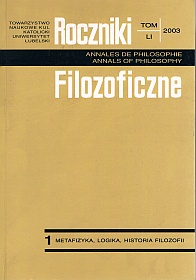The Problem of Possibility of Construction of Modal and Relevance Logics
Abstract
In the paper various ways are shown of constructing both modal and relevance logics. An attempt is undertaken of interpreting modal functors occurring in these logics. In the discussion special attention is paid to logical necessity. Connection of this necessity and tautologies of the classical sentential calculus is pointed to. Next, some intuitive considerations are quoted that resulted in accepting or refusing certain theses or rules on the ground of both modal and relevance logics. Especially much attention is paid to Gödel's rule.
It is stated that at the moment when modal and relevance logics were constructed satisfactory philosophical considerations were not made. In particular, it was not decided if the constructed systems give correct formalization of modal notions, and if they may be used for formalization of deductive ways of infering.
References
Ackermann W., Begründung einer strengen Implikation, „Journal of Symbolic Logic”, 21(1956).
Ajdukiewicz K., Zarys logiki, Warszawa 1960.
Anderson A. R., Belnap N. D., Jr., Entailment: The Logic of Relevance and Necessity, vol. I, Princeton 1975.
Anderson A. R., Belnap N. D., Modalities in Ackermann's „Rigorous implication”, „Journal of Symbolic Logic”, 24(1959).
Belnap N. D., Modal and Relevance Logics, w: Modern Logic – A Survey, ed. E. Agazzi, Dordrecht, Holland 1981.
Borkowski L., Logika formalna, Warszawa 1977.
Burks A. W., Chance, Cause, Reason, Chicago–London 1977.
Dunn J. M., Relevance Logic and Entailment, w: Handbook of Philosophical Logic, ed. F. Guenthner, D. Gabbay, vol. III, Dordrecht 1986.
Garbacz P., Uwagi o genezie współczesnej logiki modalnej, „Roczniki Filozoficzne”, 48(2000), z. 1.
Grzegorczyk A., Zarys logiki matematycznej, Warszawa 1984.
Gumański L., Logika modalna, „Ruch Filozoficzny”, 41(1984), nr 2-3.
Hughes G. E., Cresswell M. J., A New Introduction to Modal Logic, London 1996.
Hughes G. E., Cresswell M. J., An Introduction to Modal Logic, London 1974.
Kiczuk S., O niektórych problemach związanych ze stosowaniem logik modalnych, „Roczniki Filozoficzne”, 34(1986), z. 1.
Kneale W. & M., The Development of Logic, Oxford 1962.
Kotarbiński T., Wykłady z dziejów logiki, Łódź 1957.
Lechniak M., Interpretacje wartości matryc logik wielowartościowych, Lublin: RW KUL 1999.
Lemmon E. J., Henderson G. P., Is there only One Correct System of Modal Logic?, „Aristotelian Society Suppl.”, 33(1959).
Łukasiewicz J., Sylogistyka Arystotelesa z punktu widzenia współczesnej logiki formalnej, Warszawa 1988.
Łukasiewicz J., Uwagi filozoficzne o wielowartościowych systemach rachunku zdań, w: tenże, Z zagadnień logiki i filozofii, Warszawa 1961.
Łukasiewicz J., O determinizmie, w: tenże, Z zagadnień logiki ifilozofii, Warszawa 1961.
Mares E. D., Relevance Logic (1998), w: Stanford Encyclopedia of Philosophy http://plato.stanford.edu/archives/sum2000/entries/logic-relevance/.
Pogorzelski W., Elementarny słownik logiki formalnej, Białystok 1992.
Read S., Relevance Logic and Entailment, w: Routledge Encyclopedia of Philosophy, red. E. Craig, London–New York 1998.
Stępień A. B., Wstęp do filozofii, Lublin 1995.
Zawirski Z., O modalności sądów, Lwów 1914.
Żarnecka-Biały E., O potrzebie relewancji: średniowieczny atak na Dunsa Szkota, w: Między prawdą i normą a błędem, red. E. Żarnecka-Biały, Kraków 1997.
Copyright (c) 2003 Roczniki Filozoficzne

This work is licensed under a Creative Commons Attribution-NonCommercial-NoDerivatives 4.0 International License.





